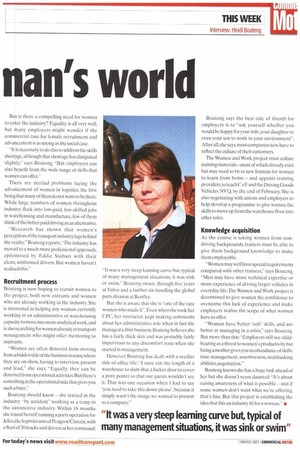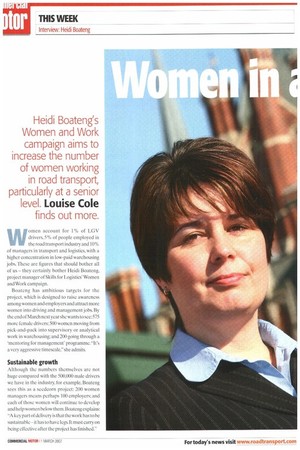nan's world
Page 27

Page 26

If you've noticed an error in this article please click here to report it so we can fix it.
Heidi Boatengis Women and Work campaign aims to increase the number of women working in road transport, particularly at a senior
level. Louise Cole
finds out more.
omen account for 1% of LGV drivers, 5% of people employed in the road transport industry and 10% of managers in transport and logistics, with a higher concentration in low-paid warehousing jobs. These are figures that should bother all of us — they certainly bother Heidi Boateng, project manager of Skills for Logistics' Women and Work campaign.
B oaten g has ambitious targets for the project, which is designed to raise awareness among women and employers and attract more women into driving and management jobs. By the end of March next year she wants to see: 575 more female drivers; 500 women moving from pick-and-pack into supervisory or analytical work in warehousing; and 200 going through a `mentoring for management' programme. "It's a very aggressive timesc.ale," she admits.
Sustainable growth
Although the numbers themselves are not huge compared with the 500,000 male drivers we have in the industry, for example, Boateng sees this as a secdcorn project: 200 women managers means perhaps 100 employers; and each of those women will continue to develop and help women below them.Boateng explains: "A key part of delivery is that the work has to he sustainable—it has to have legs. It must carry on being effective after the project has finished." But is there a compelling need for women to enter the industry? Equality is all very well. but many employers might wonder if the commercial case for female recruitment and advancement is as strong as the social case.
"It is necessary to do this to address the skills shortage, although that shortage has dissipated slightly," says Boateng. -But employers can also benefit from the wide range of skills that women can offer."
There are myriad problems facing the advancement of women in logistics, the first being that many of them do not want to be there. While large numbers of women throughout industry flock into low-paid, low-skilled jobs in warehousing and manufacture, few of them think of the better-paid driving as an alternative.
"Research has shown that women's perception of the transport industry lags behind the reality," Boateng reports. "The industry has moved to a much more professional approach, epitomised by Eddie Stobart with their clean, uniformed drivers. But women haven't realised this."
Recruitment process
Boateng is now hoping to recruit women to the project, both new entrants and women who are already working in the industry. She is interested in helping any woman currently working in an administrative or warehousing capacity to move into more analytical work, and is also searching for women already in transport management who might offer mentoring to aspirants.
"Women are often deterred from moving from a hidden side of the business to somewhere they are on show, having to interview, present and lead,she says. "Equally, they can be deterred from operational activities. But there's something in the operational side that gives you such a buzz."
Boateng should know she started in the industry by accident" working as a temp in the automotive industry. Within 18 months she found herself running a parts operation for Jefco, the logistics arm of Peugeot/Citroen.with a fleet of 30 trucks and drivers at her command: "It was a very steep learning curve but, typical of many management situations, it was sink or swim.Boateng swam, through five years at Volvo and a further six handling the global parts division at Bentley.
But she is aware that she is one of the rare women who made it-. Even when she took her CPC, her instructor kept making comments about her administrative role when in fact she managed a Om business. Boateng believes she has a fairly thick skin and was probably fairly impervious to any discomfort zone when she started in management.
However Boateng has dealt with a seedier side of office life: "I once ran the length of a warehouse to slam shut a locker door to cover a porn poster so that our guests wouldn't see it. That was one occasion when I had to say 'you need to take this down please', because it simply wasn't the image we wanted to present as a company." Boateng says the best rule of thumb for employers is to "ask yourself whether you would be happy for your wife, your daughter or even your son to work in your environment". After all,she says,most companies now have to reflect the culture of their customers.
The Women and Work project must collate training materials -most of which already exist but may need to be in new formats for women to learn from home and appoint training providers, to teach C+F and the Driving Goods Vehicles NVQ, by the end of February. She is also negotiating with unions and employers to help develop a programme to give women the skills to move up from the warehouse floor into other roles.
Knowledge acquisition
As the course is taking women from nondriving backgrounds, trainers must be able to give them background knowledge to make them employable.
"Women may well have special requirements compared with other trainees," says Boa teng. "Men may have more technical expertise or more experience of driving larger vehicles in everyday life. The Women and Work project is determined to give women the confidence to overcome this lack of experience and make employers realise the scope of what women have to offer.
"Women have better 'soft' skills, and are better at managing in a crisis," says Boateng. But more than this: "Employers still see childbearing as a threat to women's productivity but being a mother gives you an abundance of skills: time management, assertiveness, multitasking abilities, negotiation."
Boateng knows she has a huge task ahead of her but she doesn't seem daunted: -It's about raising awareness of what is possible and if some women don't want what we're offering, that's fine. But this project is establishing the idea that this an industry fit for a woman."•


























































































































































































